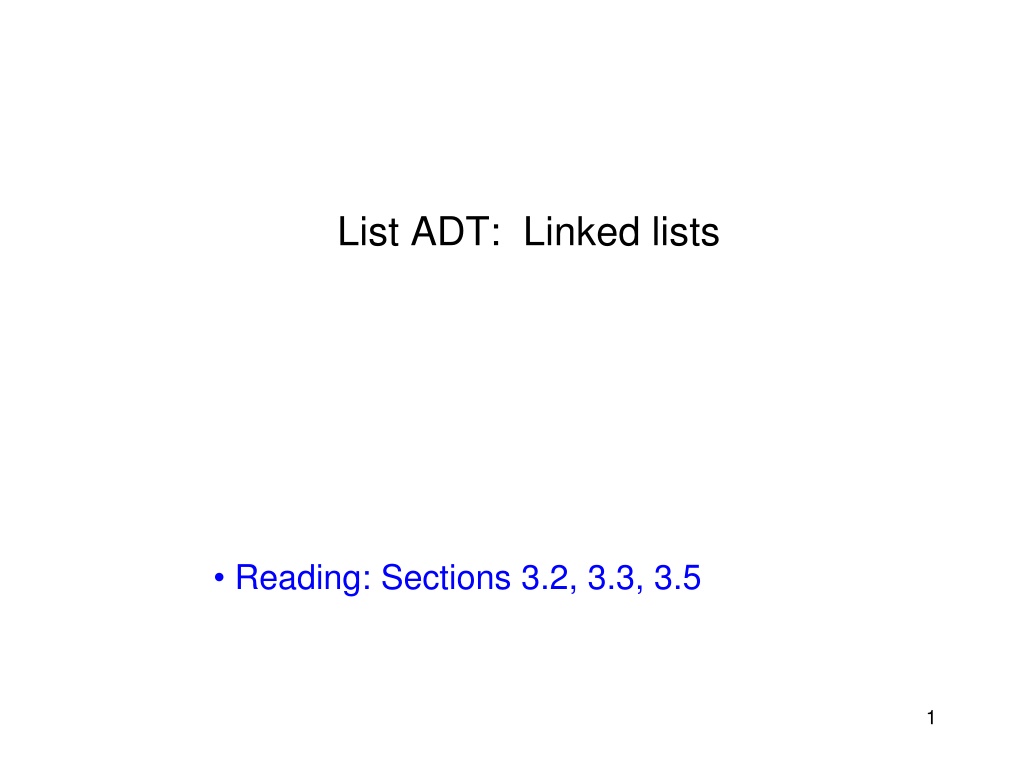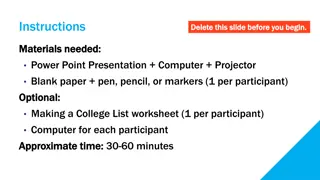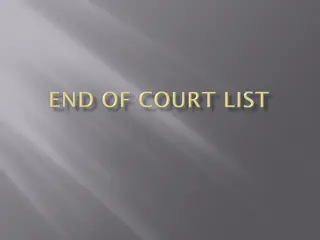
Exploring Linked Lists in List ADT Reading
Delve into the world of linked lists within the List ADT framework with discussions on everyday list applications, efficient list operations, time complexities, and list manipulation functions.
Download Presentation

Please find below an Image/Link to download the presentation.
The content on the website is provided AS IS for your information and personal use only. It may not be sold, licensed, or shared on other websites without obtaining consent from the author. If you encounter any issues during the download, it is possible that the publisher has removed the file from their server.
You are allowed to download the files provided on this website for personal or commercial use, subject to the condition that they are used lawfully. All files are the property of their respective owners.
The content on the website is provided AS IS for your information and personal use only. It may not be sold, licensed, or shared on other websites without obtaining consent from the author.
E N D
Presentation Transcript
List ADT: Linked lists Reading: Sections 3.2, 3.3, 3.5 1
Lists in Everyday Life Shopping list To-do list Dave Letterman s top 10 list List stored as a vector What if you want to insert or delete an item? How many elements you need to move? 2
List Wish List Efficiently insert an element Efficiently remove an element Remove all items Assignment operator Comparison operators Constructors/destructors Generic class Convenient way to iterate through the list 3
Singly Linked List ListElement next next next next null null prev front back? Time complexities for push_front, push_back, pop_front, pop_back? 4
Abstract view of List and Iterator Doubly-linked list ListElement next next next next null null prev prev prev prev front back I1 Iterator 5
List Public Interface Constructors and big-five Copy/move constructor, copy/move assignment operator, destructor List(); List(const List &rhs); List(List &&rhs); List & operator=(const List &rhs); List & operator=(List && rhs); ~List(); Read-only accessor functions int size() const; bool empty() const; 6
List Public Interface (contd) Accessing values on the list Object & front(); Object & back(); and their constant versions. Locating places on the list using iterators Both regular and constant versions iterator begin(); const_iterator begin() const; iterator end(); const_iterator end() const; 7
List Public Interface (contd) List manipulation functions int push_front(const Object & x); int push_back(const Object & x); int pop_front(); int pop_back(); iterator insert(iterator & itr, const Object & x); iterator erase( iterator itr); iterator erase( iterator start, iterator end ); void clear(); // and move versions, where it is applicable 8
List Complexity Requirements O(1) Runtime complexity Default constructor Move constructor Move assignment operator= push_front(t), push_back(t), insert(I, t) pop_front(), pop_back(), erase(I) begin(), end(); front(), back(); empty(); 9
List Complexity Requirements (2) O(N) Runtime complexity Copy Constructor Copy assignment operator= Destructor clear() erase(SI,EI) 10
List Iterator Public Interface Read-only operators bool operator== (const iterator & rhs) const; bool operator!= (const iterator & rhs) const; Object & operator* ( ) const; // return a reference to current value Write operators iterator & operator++ ( ); // prefix iterator operator++ ( int ); // postfix iterator& operator-- ( ); // prefix iterator operator-- ( int ); // postfix O(1) requirement for space and time 11
Using List List<string> Cities; Cities.push_front( Tallahassee ); Tallahassee Cities.push_back( Gainesville ); Tallahassee , Gainesville Cities.push_front( Jacksonville ); Jacksonville , Tallahassee , Gainesville Cities.push_back( Miami ); Jacksonville , Tallahassee , Gainesville , Miami List<string>::iterator I; for (I = Cities.begin(); I != Cities.end(); ++I) { // print list with << } // C++11 for (auto I = Cities.begin(); I != Cities.end(); ++I) { } for (const auto & city : Cities) { } 12
List Insertion Insert Orlando before Miami // sequential search for (auto I = Cities.begin(); I != Cities.end(); ++I) { if ( Miami == *I) { break; } } // insert the new string Cities.insert(I, Orlando ); Jacksonville , Tallahassee , Gainesville , Orlando , Miami // what happens if Miami is not on the list? 13
Remove all copies of an item from List Remove all elements with value Orlando List<string>::iterator I = Cities.begin(); // auto I = Cities.begin(); // c++11 while( I != Cities.end()) { if ( Orlando == *I) { I = Cities.erase(I); } else { I++; } } 14
List and List Iterator Conceptual relationship Iterator I1 begin current end List: A, B, C, D, E, F begin Iterator I2 current end 15
List Implementation A Doubly Linked List With Header and Tail Nodes as Markers An Empty List 16
Nodes in a list Node Defined within the List class, with limited scope Data Value Pointers to the previous and next element data data data prev prev prev next next next No need for contiguous memory allocation 17
List Class (Part 1) template <typename Object> class List { private: struct Node { Object data; Node *prev; Node *next; Node( const Object & d = Object{ }, Node * p = nullptr, Node * n = nullptr ) : data{ d }, prev{ p }, next{ n } { } Node( Object && d, Node * p = nullptr, Node * n = nullptr ) : data{ std::move( d ) }, prev{ p }, next{ n } { } }; 18
List Class (Part 2) public: class const_iterator { public: const_iterator( ) : current{ nullptr } // Public constructor for const_iterator. { } const Object & operator* ( ) const { return retrieve( ); } const_iterator & operator++ ( ) { current = current->next; return *this; } const_iterator operator++ ( int ) { const_iterator old = *this; ++( *this ); return old; } // prefix // postfix 19
List Class (Part 3) const_iterator & operator-- ( ) { current = current->prev; return *this; } const_iterator operator-- ( int ) { const_iterator old = *this; --( *this ); return old; } bool operator== ( const const_iterator & rhs ) const { return current == rhs.current; } bool operator!= ( const const_iterator & rhs ) const { return !( *this == rhs ); } protected: Node *current; Object & retrieve( ) const { return current->data; } const_iterator( Node *p ) : current{ p } { } friend class List<Object>; }; 20
List Class (Part 4) class iterator : public const_iterator { public: iterator( ) { } Why do we override the parent s * implementation? Object & operator* ( ) { return const_iterator::retrieve( ); } const Object & operator* ( ) const { return const_iterator::operator*( ); } iterator & operator++ ( ) { } this->current = this->current->next; return *this; Why do we override the parent s ++ implementation? iterator operator++ ( int ) { } iterator old = *this; ++( *this ); return old; 21
List Class (Part 5) iterator & operator-- ( ) { } this->current = this->current->prev; return *this; iterator operator-- ( int ) { } iterator old = *this; --( *this ); return old; protected: iterator( Node *p ) : const_iterator{ p } { } }; friend class List<Object>; 22
List Class (Part 6) public: List( ) { init( ); } ~List( ) { clear( ); delete head; delete tail; } List( const List & rhs ) { init( ); for( auto & x : rhs ) push_back( x ); } // copy constructor List & operator= ( const List & rhs ) { List copy = rhs; std::swap( *this, copy ); return *this; } // copy assignment operator= 23
List Class (Part 7) List( List && rhs ) : theSize{ rhs.theSize }, head{ rhs.head }, tail{ rhs.tail } { rhs.theSize = 0; rhs.head = nullptr; rhs.tail = nullptr; } List & operator= ( List && rhs ) { std::swap( theSize, rhs.theSize ); std::swap( head, rhs.head ); std::swap( tail, rhs.tail ); return *this; } iterator begin( ) { return iterator( head->next ); } // move constructor // move assignment operator= const_iterator begin( ) const { return const_iterator( head->next ); } 24
List Class (Part 8) iterator end( ) { return iterator( tail ); } const_iterator end( ) const { return const_iterator( tail ); } int size( ) const { return theSize; } bool empty( ) const { return size( ) == 0; } void clear( ) { while( !empty( ) ) pop_front( ); } Object & front( ) { return *begin( ); } const Object & front( ) const { return *begin( ); } 25
List Class (Part 9) Object & back( ) { return *--end( ); } const Object & back( ) const { return *--end( ); } void push_front( const Object & x ) { insert( begin( ), x ); } void push_back( const Object & x ) { insert( end( ), x ); } // copy // copy void push_front( Object && x ) { insert( begin( ), std::move( x ) ); } void push_back( Object && x ) { insert( end( ), std::move( x ) ); } // move // move void pop_front( ) { erase( begin( ) ); } void pop_back( ) { erase( --end( ) ); } 26
List Class (Part 10) iterator insert( iterator itr, const Object & x ) { Node *p = itr.current; ++theSize; return iterator( p->prev = p->prev->next = new Node{ x, p->prev, p } ); } iterator insert( iterator itr, Object && x ) { Node *p = itr.current; ++theSize; return iterator( p->prev = p->prev->next = new Node{ std::move( x ), p->prev, p } ); } 27
List Class (Part 10) iterator erase( iterator itr ) { Node *p = itr.current; iterator retVal( p->next ); p->prev->next = p->next; p->next->prev = p->prev; delete p; --theSize; return retVal; } iterator erase( iterator from, iterator to ) { for( iterator itr = from; itr != to; ) itr = erase( itr ); return to; } 28
List Class (Part 11) private: int theSize; Node *head; Node *tail; void init( ) { theSize = 0; head = new Node; tail = new Node; head->next = tail; tail->prev = head; } }; 29
Reading assignment Sections 3.6 and 3.7 A problem to consider Assuming that we do not maintain theSize member variable, how do we determine the number of elements in a list using a recursive function? 30






















